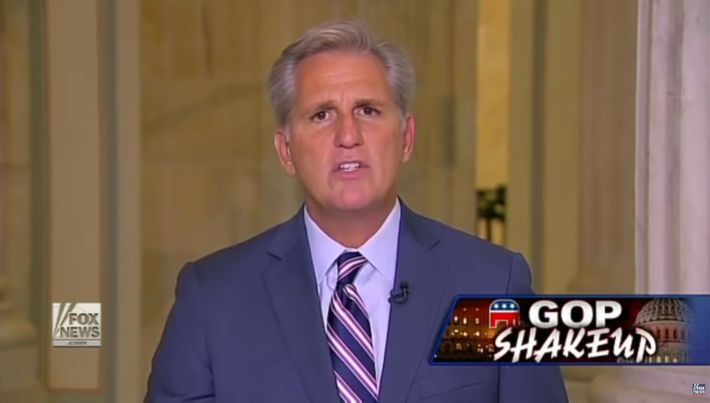
Most weeks, New York Magazine writer-at-large Frank Rich speaks with contributor Alex Carp about the biggest stories in politics and culture. This week: Hillary Clinton’s image rehab, the prospects of gun control after Oregon, and the race for the speaker of the House.
Tomorrow marks the one-month anniversary of Hillary Clinton’s much-publicized plan to appear more personable, which so far has culminated with her appearance on SNL last weekend. What’s worked best for her, and what’s been most awkward so far?
What’s working best for Clinton is the Republicans. House-speaker-in-waiting Kevin McCarthy’s statement that his party was pursuing its endless Benghazi investigation to bring down her poll numbers was manna from heaven for the Clinton campaign. The September 2012 attack on the American diplomatic mission in Benghazi has never gained any real traction as a partisan political issue — just ask Mitt Romney, who tried to milk it in the stretch of his ill-fated campaign. But McCarthy’s truthful admission has flipped the question entirely: Now the issue is not going to be what happened at Benghazi but Congress’s waste of taxpayers’ money and time on a wild-goose chase that sullies and insults the memories of the Americans who were slaughtered there. Clinton is already playing the moral-outrage card brilliantly in public statements and in an ad in wide circulation on the web. Her scheduled October 22 appearance before the Benghazi committee — once thought to be a D-Day for Trey Gowdy and his fellow House inquisitors — looms as a self-inflicted Waterloo for them instead.
Clinton’s SNL appearance, hitting just the right note of cheerful self-mockery, was winning. But her subsequent attempts to show humor and spontaneity and heart (all words used by her own campaign team to describe the latest re-branding of her candidacy) will not have the benefit of SNL writers, or cue cards, or Darrell Hammond, whose brief cameo as Bill provided the biggest laugh in the sketch. And should Joe Biden get into the race, as Washington increasingly seems to believe, he’ll have the advantage on humor and spontaneity in the Democratic race. Or he will unless Bernie Sanders reveals heretofore hidden comic chops when he appears on Ellen DeGeneres’s show next week.
Clinton has also laid out a plan for gun reform, the first real proposal from a presidential candidate in the wake of last week’s Oregon shooting. Do you think there’s enough momentum for things to change?
Clearly not. President Obama, in full-throated, liberated lame-duck mode, spoke for many when he expressed his frustration, even anger, about the unwillingness of America to face up to, let alone curb, its gun epidemic. Until it does, neither Clinton nor any other single politician can make a significant difference. Nor can the usual round of op-eds (which increasingly read like boilerplate, no matter how much the volume of the outrage is pumped up), or a heartfelt monologue by Stephen Colbert, or all the money poured into gun-control campaigns (including in Oregon) by Michael Bloomberg. It’s good to see Clinton step up her rhetoric after she waffled on gun issues in her last presidential campaign. (In 2008, she took to bragging about her own childhood experiences as a suburban Annie Oakley after Obama was caught on video decrying Americans who “cling to guns or religion.”) And we must hope that the executive orders she proposes for a putative Clinton presidency could make some difference on the margins. But Republicans and red-state Democrats remain immovable on gun control. When Jeb Bush dismissed the latest massacre as “stuff happens” — all too revealingly, the same phrase his brother’s secretary of Defense used to trivialize the lethal Iraq insurgency in 2003 — it revealed that gun-control measures aren’t on the table for serious discussion even among supposedly more moderate Establishment Republicans. Indeed, George W. Bush’s former speechwriter Michael Gerson wrote yesterday that gun reforms are doomed in part because “Obama doesn’t know how to work with Congress” — as if a single Republican leader in either the Senate or the House would work with any president on any challenge to the theoretical sanctity of the Second Amendment.

With his Benghazi gaffe, Kevin McCarthy opened the door for competitors also hoping to be the next House speaker, and Planned Parenthood attack dog Jason Chaffetz has jumped in. What should we expect from the next leader of the House?
Chaos! Even the process of selecting the new leadership team has already broken down. The votes that the Republican caucus had scheduled for Thursday have been postponed until October 29. This timing could not be more perfect for the tea-party hardliners who have been celebrating John Boehner’s departure and angling for leverage to precipitate a government shutdown. October 29 is the same day that the government’s transportation authority expires; November 5 is the drop-dead date by which the government’s debt ceiling must be raised to avoid defaulting on its fiscal obligations. By then Boehner will be gone, but the party’s civil war will be intact, no matter who is his successor — assuming there can even be an agreement on who the successor is.
Not that the identity of the speaker much matters in the big picture, but few believe that McCarthy is seriously threatened by Chaffetz, whose humiliating deployment of a fictitious graph in his interrogation of Planned Parenthood’s Cecile Richards suggests that he lacks the basic competence to run his own congressional office. The leadership ranks in the House are so barren that the conservative pundit Jonah Goldberg has seriously proposed that Republicans draft Newt Gingrich to return as speaker instead. Or, if that gambit fails, the GOP can turn to another former speaker, Denny Hastert, a onetime wrestling coach who at the very least can put a chokehold on recalcitrant members. True, there is that little matter of the $3.5 million in hush money that Hastert allegedly paid to silence a former student’s sexual-abuse allegations. But the good news, reported by The Wall Street Journal last week, is that “a possible plea agreement” is in the works, potentially freeing Hastert for further public service at his party’s time of need. Surely he’d be no worse than the presumed new House majority leader, Steve Scalise, the Louisiana congressman whose résumé includes having addressed a white-supremacist organization founded by David Duke, formerly of the Ku Klux Klan.






























